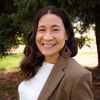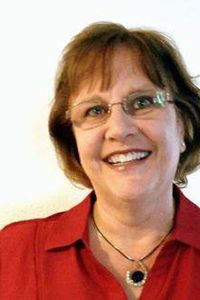Debra Gerkin
Debra Gerkin (also known as Debbie) was an at-large member of the Aurora Public Schools Board of Education in Colorado. She assumed office on December 5, 2017. She left office on December 2, 2025.
Gerkin ran for re-election for an at-large seat of the Aurora Public Schools Board of Education in Colorado. She won in the general election on November 2, 2021.
Elections
2021
See also: Aurora Public Schools, Colorado, elections (2021)
General election
General election for Aurora Public Schools Board of Education At-large (4 seats)
The following candidates ran in the general election for Aurora Public Schools Board of Education At-large on November 2, 2021.
Candidate | % | Votes | ||
| ✔ |  | Anne Keke (Nonpartisan)  | 20.1 | 19,461 |
| ✔ |  | Michael Carter (Nonpartisan)  | 18.4 | 17,801 |
| ✔ |  | Debra Gerkin (Nonpartisan) | 17.9 | 17,291 |
| ✔ |  | Tramaine Duncan (Nonpartisan) | 15.2 | 14,751 |
 | Christy Cummings (Nonpartisan)  | 14.5 | 14,047 | |
 | Danielle Tomwing (Nonpartisan)  | 13.9 | 13,485 | |
| Total votes: 96,836 | ||||
 = candidate completed the Ballotpedia Candidate Connection survey. = candidate completed the Ballotpedia Candidate Connection survey. | ||||
| If you are a candidate and would like to tell readers and voters more about why they should vote for you, complete the Ballotpedia Candidate Connection Survey. | ||||
Do you want a spreadsheet of this type of data? Contact our sales team. | ||||
Withdrawn or disqualified candidates
- Marques A. Ivey (Nonpartisan) (Unofficially withdrew)
2017
- See also: Aurora Public Schools elections (2017)
Four of the seven seats on the Aurora Public Schools Board of Education in Colorado were up for nonpartisan general election on November 7, 2017. The race included incumbent Barbara Yamrick and challengers Kyla Armstrong-Romero, Jane Barber, Kevin Cox, Debra Gerkin, Marques Ivey, Miguel In Suk Lovato, Gail Pough, and Lea Steed. Armstrong-Romero, Cox, Gerkin, and Ivey won the spots on the board.[1]
Results
| Aurora Public Schools, At-large General Election, 4-year terms, 2017 |
||
|---|---|---|
| Candidate | Vote % | Votes |
| 16.58% | 12,636 | |
| 16.26% | 12,391 | |
| 15.13% | 11,527 | |
| 12.9% | 9,830 | |
| Gail Pough | 9.76% | 7,441 |
| Miguel In Suk Lovato | 8.91% | 6,793 |
| Jane Barber | 7.15% | 5,447 |
| Barbara Yamrick Incumbent | 7.07% | 5,385 |
| Lea Steed | 6.25% | 4,760 |
| Total Votes | 76,210 | |
| Source: Arapahoe County, Official Results," accessed August 28, 2023 and Adams County Elections Office, "Official Results," accessed August 28, 2023 | ||
Funding
Gerkin reported $4,690.00 in contributions and $4,516.21 in expenditures to the Colorado Secretary of State, which left her campaign with $173.79 as of December 8, 2017.[2]
Endorsements
Gerkin was endorsed by the Aurora Education Association, the Aurora Sentinel, Our Revolution Metro Denver, and the Denver Area AFL-CIO.[3][4][5][6]
Campaign themes
2021
Ballotpedia survey responses
See also: Ballotpedia's Candidate Connection
Debra Gerkin did not complete Ballotpedia's 2021 Candidate Connection survey.
2017
Chalkbeat questionnaire
Gerkin participated in the following questionnaire conducted by Chalkbeat. The questions provided by the news organization appear bolded, and Gerkin’s responses follow below.
Tell us a bit about yourself. How long have you lived in the school district? What do you do for a living?
| “ | I’ve lived in Aurora for 40 years. This is where my husband and I made our home and raised our children. I’ve worked as a teacher and principal in APS for over 20 years, and in the last eight years since retirement, I’ve been coaching new teachers in the district. Though I’ve always made my living as an educator, education isn’t my only passion. Being bi-vocational, I’m also a clergywoman. Next year I’ll celebrate 40 years of ordained ministry. In my free time I love to read, quilt, and travel. I’m learning how to play golf, and I’m a member of the Aurora Rotary Club. I look for joy in ordinary things and post a picture of it every day on Facebook.
I have a strong sense of social justice, believe deeply in the democratic ideal of public education, and I’m convinced that we’re all in this together. I understand the strength of community and work for the inclusion of all. I believe in living purposefully, saying thank you, and giving a voice to the voiceless. I’ve been married to Phil for 42 years. Together we have three grown children, five grandchildren, and a yorkie-schnauzer mix named Cookie.[7] |
” |
| —Debra Gerkin (2017)[8] | ||
Tell us about your connection to the school district.
| “ | My entire teaching career – over 20 years – took place in Aurora, including my tenure as principal of Crawford Elementary School. But that wasn’t the first time Crawford appeared in my family story — my husband went to Crawford — and my husband’s mother went to Crawford! All three of my daughters graduated from Gateway High School, and now, two of my grandchildren are students at Aurora Quest K-8. Before retirement, my husband taught in Aurora, and two of my daughters teach in Aurora now. That’s a lot of investment in Aurora Public Schools![7] | ” |
| —Debra Gerkin (2017)[8] | ||
The district’s state test scores improved this year, enough to lift the district’s state quality rating and get APS off the accountability clock. Why do think the district was able to achieve this, and do you think APS is on the right track?
| “ | Student achievement is accelerated when teachers focus their instruction precisely on what students need to know in order to learn. They do this by using ongoing, formative assessments to determine their students’ knowledge of curriculum, carefully evaluating their students’ strengths and next steps, and differentiating instruction to meet the individual needs of students. They must match students with appropriate resources, approaches, and strategies, set high expectations for learning, monitor student growth over time, and work hard to meet the diverse needs of everyone, including second language learners, high performing students, and students with special needs. Teachers, parents, and students worked hard to make this happen. So, yes, APS is on the right track.
To continue moving forward, APS must:
|
” |
| —Debra Gerkin (2017)[8] | ||
Some candidates have said they would like the school board to have more accountability or transparency. What would you say to that, and should anything change on that issue?
| “ | Transparency in all things is essential when spending public dollars. Transparency should exist both in access to Board agendas and minutes, as well as in finanacial reports. Stakeholders should be able to easily access Board agendas well in advance of the meetings and should be able to review Board decisions and agendas well into the past. Aurora Public Schools provides this access, though I would suggest making it more obvious for readers as they visit the APS home page. From a financial standpoint, community members should also know how their tax dollars are being spent, what various programs involve and how much they cost, what the true cost of educating children is, and what the District sees as priorities. Balancing Act, the new budget tool on the APS website, offers stakeholders the opportunity to learn more about how APS is funded and how it spends its dollars; it even lets them participate interactively to submit their own strategy for balancing the budget. When citizens see how schools are funded (and not funded,) they may be more inclined to work for greater equity in school funding.[7] | ” |
| —Debra Gerkin (2017)[8] | ||
Aurora has sought to increase school quality by recruiting the high-performing charter school network DSST. Is this a sound strategy and was the process sound, or would you have done anything differently?
| “ | Although charter schools offer one kind of choice for parents, they do not offer a clear advantage for students. In general, about one-fourth of charter schools perform better than traditional public schools, and about one-fourth do worse; the rest are a wash. DSST is one of those schools in the top quarter. It has a proven track record of performance, and clearly, students and parents speak highly of it.
Nevertheless, I have concerns. Charter schools pull money away from traditional classrooms – thousands of dollars per student – money that is badly needed, especially at a time when APS redesigned its budget to accommodate millions of dollars worth of cuts and is likely to face more budget challenges in the future. Additionally, charter schools lack public transparency and accountability, receive waivers from school laws that traditional schools must follow, and have the very real possibility of re-segregating our schools. For these reasons, Aurora Public Schools must be very cautious when considering any new charter school within the District. Recruiting them seems ill advised.[7] |
” |
| —Debra Gerkin (2017)[8] | ||
What role do you believe local school boards should have in reviewing, approving or managing charter schools that wish to open in the district?
| “ | School boards should carefully analyze each charter school’s application to ensure the charter has high quality, academic programs and sound fiscal management plans in place to meet the needs of all APS students who might be in their care, whether preparing for college or career. This must be done with careful scrutiny, as most charter schools do not out perform traditional public schools. Charter schools should demonstrate in their contract proposals that they have secured a building that is safe and appropriate for the students who would be attending, that they have avenues built in for public transparency and accountability, and that they have the same high level of commitment and responsibility to all their students as do traditional public schools.[7] | ” |
| —Debra Gerkin (2017)[8] | ||
Aurora Public Schools is likely to continue facing budget issues. What funding do you think ought to be cut, and how should the district go about deciding what should be cut?
| “ | It is always important to make smart, financial decisions, but it is imperative to do so during lean economic times. A primary responsibility of the Board of Education is to be the steward of taxpayer dollars. A challenging budget requires setting critical priorities that keep teachers, instruction, and teacher resources needed to accelerate student achievement at the top of the list. For instance, we cannot cut the budget by reducing a school’s teaching and support staff and increasing class size; this harms kids. We cannot cut the budget by decreasing early childhood education and eliminating full day kindergarten; this harms kids. We cannot cut the budget by decreasing access to high quality curriculum and adequate classroom resources; this harms kids. Instead, we must look for ways to be more efficient in other areas. Clearly, budget cuts are painful; they require difficult choices, which can only be made through thoughtful reflection, strategic planning, and a commitment to putting children first.[7] | ” |
| —Debra Gerkin (2017)[8] | ||
Do you agree with the resolution the school board passed earlier this year to support immigrant and refugee students? How would you judge what the district is doing to respond to the concerns of those communities?
| “ | Yes, I agree whole-heartedly with the Resolution to Reaffirm APS’s Inclusive Practices and Beliefs for All Students Regardless of Documentation Status. In fact, I spoke before the board in favor of it. Here’s an excerpt from my address: “Of course, parents want us to teach their children, but the number one thing that parents want us to do is keep their children safe. While this resolution doesn’t have the power to guarantee a child’s safety from all possible calamities, it does have the power to send a critical message. It intentionally names the baseline of school culture for all our students – whether immigrant or native-born – that Aurora Public Schools is a welcoming community, that we embrace our strength of diversity, that we protect families’ rights, that we care about students’ emotional wellbeing – not just their test scores – and that we stand beside all of them as they work to shape a successful future.”
Passing a resolution is a good start, but as with any policy, it’s only as good as the way in which it is implemented. We must intentionally bring all voices to the table, foster better relationships, and receive ongoing feedback in order to strengthen our community groups.[7] |
” |
| —Debra Gerkin (2017)[8] | ||
What do you see as the biggest issue facing Aurora schools today and how do you hope to have an impact on said issue as a school board member?
| “ | The easy and obvious answer here is the need to improve student achievement so that students are ready for success in either college or career. But the harder work comes as we dig down deep to discover the root causes of low performance. All schools are not the same; it would be impossible and unfair to say exactly what the root causes of difficulties are without first doing a careful analysis of each school. Teaching and learning are complex, as are the challenges that schools face. Possible causes might be the inability to recruit and retain teachers beyond a few years, resulting in “teacher churn” and an inexperienced teaching staff; not hiring enough teachers of color to whom students of color can more closely relate; not adequately educating and empowering parents to work in partnership with their children’s teachers; not having a razor-sharp focus on best practices for instruction; and not adequately addressing the needs of English language learners and newcomers to the United States. These challenges will take time to resolve, but they are doable! The Board’s role in transformative change is to ask important questions, keep expectations high, hold people accountable, and continually keep the focus on children.[7] | ” |
| —Debra Gerkin (2017)[8] | ||
See also
2021 Elections
External links
Footnotes
- ↑ Aurora Public Schools, "APS Board of Education Election," accessed September 7, 2017
- ↑ Colorado Secretary of State, "Campaign Finance Database: Political Race Search," accessed December 8, 2017
- ↑ Aurora Education Association, "2017 Board of Education Endorsements," September 5, 2017
- ↑ Aurora Sentinel, "Endorsements: 2017 Aurora City Council, APS elections promise change — our picks to ensure it," October 12, 2017
- ↑ Facebook, "Our Revolution Metro Denver," accessed October 31, 2017
- ↑ Denver Area Labor Federation, "2017 Municipal Endorsements," June 29, 2017
- ↑ 7.0 7.1 7.2 7.3 7.4 7.5 7.6 7.7 7.8 Note: This text is quoted verbatim from the original source. Any inconsistencies are attributable to the original source.
- ↑ 8.0 8.1 8.2 8.3 8.4 8.5 8.6 8.7 8.8 Chalkbeat, "We asked the 2017 Aurora school board candidates nine questions. Here are their responses," October 5, 2017








